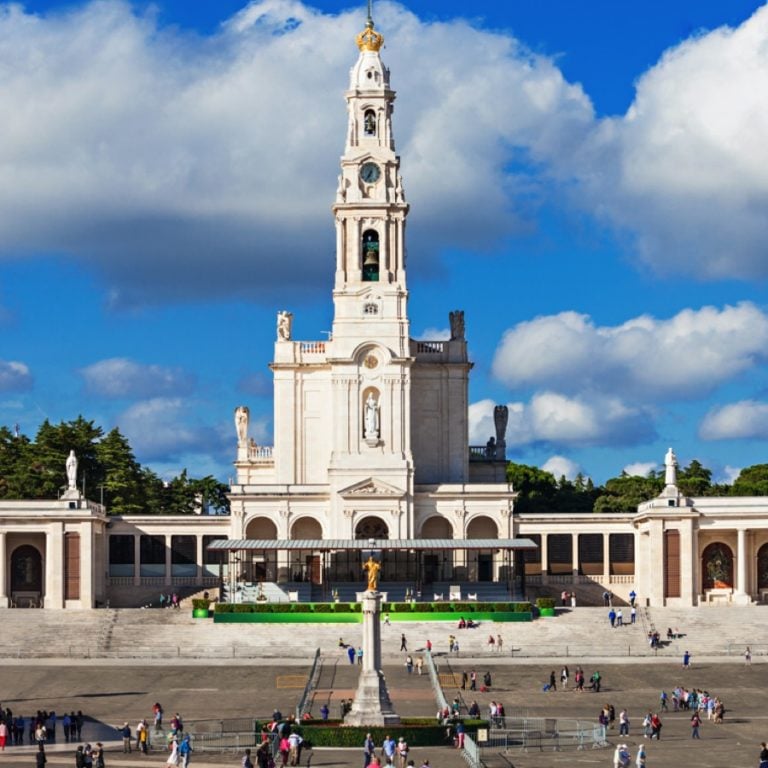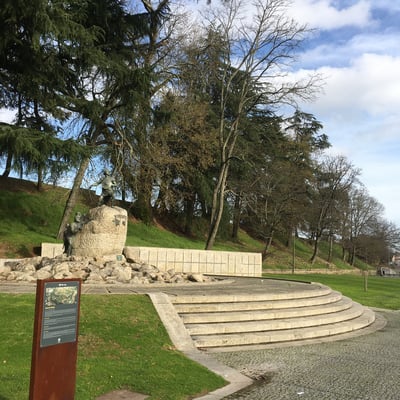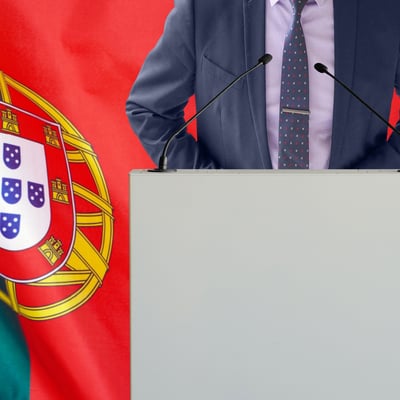1
00:00:03,192 –> 00:00:09,131
Um dos locais religiosos mais emblemáticos de Portugal é a cidade de Fátima.
{{One of Portugal’s most emblematic religious sites is the city of Fatima.}}
2
00:00:09,132 –> 00:00:13,732
A história religiosa deste local começou em 1917,
{{The religious history of this place began in 1917,}}
3
00:00:13,732 –> 00:00:16,352
quando, segundo o testemunho do povo,
{{when, according to the testimony of the people,}}
4
00:00:16,352 –> 00:00:20,232
uma senhora vestida de branco apareceu a três pastorinhos
{{a lady dressed in white appeared to three little shepherds}}
5
00:00:20,232 –> 00:00:23,792
que andavam a guardar um rebanho naquela zona.
{{who were guarding a herd in that area.}}
6
00:00:23,792 –> 00:00:25,892
Duas das crianças eram irmãos
{{Two of the children were siblings}}
7
00:00:25,892 –> 00:00:29,092
e a terceira era prima de ambos.
{{and the third was their cousin.}}
8
00:00:29,092 –> 00:00:31,552
As crianças relataram que essa senhora,
{{The children reported that that lady,}}
9
00:00:31,552 –> 00:00:35,312
que surgiu em cima de uma azinheira no dia 13 de maio,
{{who appeared on top of a holm oak tree on May 13th,}}
10
00:00:35,312 –> 00:00:39,532
lhes pediu que orassem e rezassem o terço todos os dias
{{asked them to pray (to God) and pray (recite) the rosary every day}}
11
00:00:39,532 –> 00:00:43,072
e que voltassem àquele lugar todos os meses,
{{and come back to that place every month,}}
12
00:00:43,072 –> 00:00:46,452
no mesmo dia, à mesma hora.
{{on the same day, at the same time.}}
13
00:00:46,452 –> 00:00:48,872
Assim fizeram durante cinco meses,
{{So they did for five months,}}
14
00:00:48,872 –> 00:00:51,312
até ao dia 13 de outubro.
{{until October 13th.}}
15
00:00:51,312 –> 00:00:52,992
A cada mês que passava,
{{With each month that passed,}}
16
00:00:52,992 –> 00:00:57,412
a curiosidade do povo sobre as ditas visões ia aumentando.
{{the people’s curiosity about these so-called visions was growing.}}
17
00:00:57,412 –> 00:01:00,832
Contudo, as pessoas que se deslocavam àquele lugar
{{However, the people who went to that place}}
18
00:01:00,832 –> 00:01:02,992
na companhia das 3 crianças,
{{in the company of three children,}}
19
00:01:02,992 –> 00:01:05,492
diziam que não conseguiam ver nada,
{{said they couldn’t see anything,}}
20
00:01:05,492 –> 00:01:08,112
pelo que começaram a desconfiar.
{{so they began to distrust [the claims].}}
21
00:01:08,112 –> 00:01:10,292
As pessoas afirmaram então que,
{{People then claimed that,}}
22
00:01:10,292 –> 00:01:12,372
se as visões eram verdadeiras,
{{if the visions were true,}}
23
00:01:12,372 –> 00:01:16,092
teria de aparecer um sinal para que pudessem acreditar.
{{a sign would have to appear for them to believe.}}
24
00:01:16,092 –> 00:01:18,112
Segundo os relatos da altura,
{{According to reports at the time,}}
25
00:01:18,112 –> 00:01:21,032
o sol terá começado a girar no céu,
{{the sun will have started spinning in the sky,}}
26
00:01:21,032 –> 00:01:24,652
acontecimento que foi chamado de Milagre do sol.
{{[an] event that was called the Miracle of the Sun.}}
27
00:01:24,652 –> 00:01:28,672
A senhora terá transmitido três segredos às crianças,
{{The lady will have passed on three secrets to the children,}}
28
00:01:28,672 –> 00:01:32,152
segredos esses que eles não deveriam divulgar.
{{secrets that they shouldn’t divulge.}}
29
00:01:32,152 –> 00:01:35,452
Segundo o relato de Lúcia, uma das crianças,
{{According to account of Lúcia, one of the children,}}
30
00:01:35,452 –> 00:01:40,892
um dos milagres estaria ligado ao atentado sofrido pelo Papa João Paulo II
{{one of the miracles would be linked to the attack suffered by Pope John Paul II}}
31
00:01:40,892 –> 00:01:45,172
no dia 13 de maio de 1980, em Roma.
{{on May 13, 1980, in Rome.}}
32
00:01:45,172 –> 00:01:48,592
Dois dos pastorinhos, Francisco e Jacinta,
{{Two of the little shepherds, Francisco and Jacinta,}}
33
00:01:48,592 –> 00:01:51,091
acabaram por falecer ainda em criança
{{ended up passing away as children}}
34
00:01:51,091 –> 00:01:53,242
devido a problemas de saúde.
{{due to health problems.}}
35
00:01:53,242 –> 00:01:56,812
Já Lúcia, viveu até aos 97 anos.
{{Lucia, on the other hand, lived to be 97.}}
36
00:01:56,812 –> 00:01:59,372
A partir de 1917,
{{As of 1917,}}
37
00:01:59,372 –> 00:02:02,832
Fátima tornou-se num grande centro de peregrinação,
{{Fatima has become a great center of pilgrimage,}}
38
00:02:02,832 –> 00:02:08,092
com milhões de fiéis a deslocarem-se até ao Santuário todos os anos,
{{with millions of believers coming to the shrine every year,}}
39
00:02:08,092 –> 00:02:13,092
em homenagem à Nossa Senhora de Fátima.
{{in honor of Our Lady of Fatima.}}
 We respect your privacy and have a ZERO TOLERANCE for spam.
We respect your privacy and have a ZERO TOLERANCE for spam.
















Why is a rosary called “o terço” and not “o rosario?” Thanks, Cheri
I looked this up and it seems that the full prayer, the Rosary, consisted of 150 Hail Mary’s (now 200), and this was at some point split into three sets of prayers -> this three-part division is what originated the name “terço” (third part), which was extended to the object itself, which only has 50 beads.
OK, back in my day, we only had 3 mysteries (now there’s 4). But in 1917, there were still 3. I remember the decades stuff, but I didn’t really remember the mysteries stuff. So I looked it up. You are to pray to certain mysteries on certain days. So one out of 3 mysteries is 1/3 or terço. So I think that is what you are talking about (and I’m trying to remember this stuff from almost 50 years ago!!) Thanks!!
Yes! Each mystery is apparently represented by 50 beads (5 decades), and that’s what the terço consists of as well 🙂
This is a bit of a complicated question. In the story, the phrase “Segundo os relatos da altura, o sol terá começado a girar no céu” is translated as “According to reports at the time, the sun will have started spinning in the sky.” This seems to be a precise translation as the verb “terá começado” is simple future+past particle, so “will have started” is an accurate word-for-word translation. But it seems to me (maybe I’m wrong…) that this would be translated in English (at least in the States) as “According to reports at the time, the sun began to spin in the sky…” or perhaps “According to reports at the time, the sun began spinning in the sky.” I’ve noticed this discrepancy elsewhere in Portuguese: where we would say “began to fall,” European Portuguese seems to say “terá caído,” or “will have fallen.” The latter is very odd sounding to the American ear. I’m no grammarian, and so may be wrong in my assumptions about English grammar. Could you comment?
Yes, “will have started” is a very literal translation, to help everyone see what’s going on in the Portuguese sentence. You are right in saying that it could simply be translated to “started/began”.
In Portuguese, the construction “terá começado” could also be replaced by “começou”, but “terá começado” helps express an added level of uncertainty about what’s being said, like when we say that something allegedly happened. So, you’ll often see this construction whenever an unconfirmed fact is being reported, as is the case here.